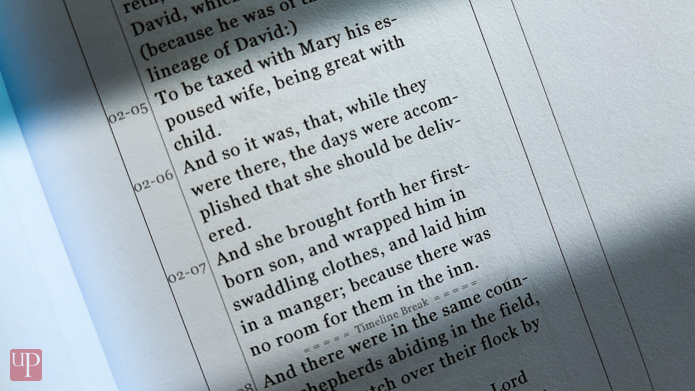After I finished the structural work on this project, something interesting occurred. When I least expected it; a person asked — “Do you think you discovered anything new?”
To explain a little, the Gospel Comparative takes the King James Version (KJV) of the four canonical gospels and lays them out as a single narrative as well as being a side-by-side and line-by-line comparative that seamlessly integrates with the narrative. So naturally when some people learned of this work, they wondered about my experience of delving into the gospel text for what is naturally a very detailed, extended period time.
Needless to say, there were many things that I've learned and continue to learn. So I wouldn't use the word “discovered,” but one thing I can reference is a recurring observation from the reaction I always get when I share a particular bit of information I leaned when this project began. Early on I discovered;
1) The birth of Jesus is comprised of just seven verses. Three actually; as the first four account for why they had to travel to Bethlehem, not the actual birth.
2) It’s only recorded in a single account — Scene 009 (Luke 2:1-7).
When I share this with people their reaction is always; “Really? I never knew that...” And as I reflect on it, I think “well, neither did I...” or more precisely, I never gave it any thought. Never thought to investigate it. Never thought to read it for myself.
And yet for anyone who first looks at this book, it is a rather startling experience to see all the blank space. Area or “spaces” where there’s no text in the column(s) signifies there’s no corresponding story content in the account of that gospel within that scene.
Only three verses... Three verses to record the most celebrated religious event in all human history. Another sixteen verses if you include the shepherds finding the infant Jesus and again, all only in the gospel according to Luke. It became a bit more intriguing for me as I think about it, because it was well into the Christmas season when I began the publication process.
I think; “talk about humble beginnings…"
significance |sigˈnifikəns| noun
1 the quality of being worthy of attention; importance : adolescent education was felt to be a social issue of some significance.
2 the meaning to be found in words or events : the significance of what was happening was clearer to me than to her.
3 (also statistical significance) the extent to which a result deviates from that expected to arise simply from random variation or errors in sampling.
ORIGIN late Middle English (denoting unstated meaning): from Old French, or from Latin significantia, from significare ‘indicate, portend.’
Significance?
I included the definition in this article because I’ve been asking myself;
Is there any significance to this fact?
Is there any significance to the observation of peoples reactions?
So what if it’s only three verses?
So what if it’s recorded in just one account?
In the definition, items 1 and 2 for me are quite obvious;
But the third one did give considerable pause;
“the extent to which a result deviates from that expected to arise;”
That’s the cause for the reaction I observe in people. It’s not what people expected. They all say “I never knew that...” often with considerable amazement. But what they’re really saying is “I never ‘expected’ to hear that.” “I never ‘expected’ to know that.” “I just assumed there would be something more or something different.” Myself included.
Apparently, we just assume. It seems generally we simply assume that all the gospels are the same and therefore they all tell the same story, which is true; but it’s also not entirely accurate. They all tell a story of the same person (Jesus), but they all have their own perspective. They all have their own choices for relevant content. When compared side-by-side, some tell of scenes which converge with each other and others tell of scenes completely apart from the rest.
This is part of a bigger realization I experienced as I began publicizing this project. I continued to encounter one person after the other, basically saying that they knew the story of Jesus, but they really didn't know the gospels at all. I've gone on to ask many people, “how did you first learn about the story?” Most people would say "oh in school" or "you know like in church or wherever…” Some simply stated movies or television.
So I think sometimes the significance of what I've learned and continue to learn is not just about the gospels themselves, but also about us. The amusing irony being, in part anyway, is that maybe this is what the gospels might be intended to do… to not just teach about the specific content within each account, but to also help us learn about all the blank space in between. In a very real sense; we are the blank space.
My sincere appreciation as always for the support of my family, friends and associates in helping me publicize this work. To learn more about the Gospel COMPARATIVE book and how it enables anyone to read all the gospels simultaneously go to:
http://www.gospelcomparative.org/
Many Thanks and More to Come -
